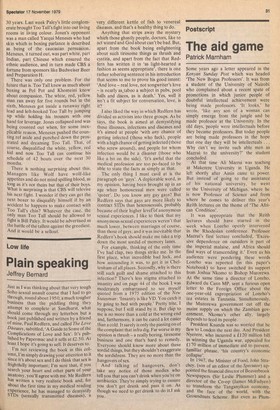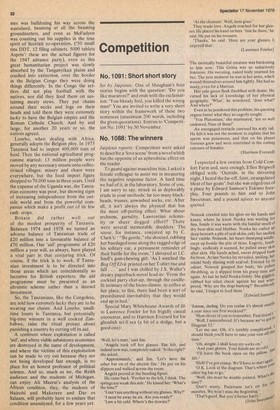Postscript
The aid game
Patrick Marnham
Some years ago a letter appeared in the Kenyan Sunday Post which was headed 'The New Bogus Professors'. It was from a student of the University of Nairobi who complained about a recent spate of promotions in which junior people of doubtful intellectual achievement were being made professors. 'It looks,' he wrote, 'like any son of a woman can simply emerge from the jungle and be made professor at the University. In the old days, people were intellectuals before they became professors. But today people are being made professors in the hope that one day they will be intellectuals ... Why can't we invite such able men as Mazrui to the university?' the student concluded.
At that time Ali Mazrui was teaching at Makerere University in Uganda. He left shortly after Amin came to power. But instead of going to the assistance of his national universit), he went to the University of Michigan, where he is now Professor of Science and from where be comes to deliver this year's Reith lectures on the theme of 'The African Condition'.
It was appropriate that the Reith lectures should have started in the week when Lonrho openly intervened in the Rhodesian conference. Professor Mazrui's first lecture concluded, 'Excessive dependence on outsiders is part of the imperial malaise, and Africa should find ways of transcending it.' Even as his audience were pondering these words Lonrho was reported (in this paper's Notebook) to have switched its support from Joshua Nkomo to Bishop Muzorewa. At the same time a director of Lonrho. Edward du Cann MP, sent a furious open letter to the Foreign Office about the one-year-old expropriation of Lonrho's tea estates in Tanzania. Simultaneously, the Muzorewa government cut off the maize supply on which the Zambian government, Nkomo's other ally, largely depends to feed its people. President Kaunda was so worried that he flew to London the next day. And President Nyerere, who incurred a £120 million bill in winning the Uganda war, appealed for £170 million of immediate aid to prevent, familiar phrase, `his country's economic collapse'.
In 1947, the Minister of Food, John Strachey, (son of an editor of the Spectator) appointed the financial director of Beaverbrook Newspapers (Sir Leslie Plummer) and a director of the Co-op (James McFadyen) to transform the Tanganyikan economy, and the face of the world, with the Groundnuts Scheme. But even as Plum mer was bulldozing his way across the wasteland, beaming at all the beaming groundnutters, and even as McFadyen was counting out his supplies in the true spirit of Scottish co-operation, ('50 small tins DDT, 12 filing cabinets, 5000 tablets Asprin': these are the actual figures for the 1947 advance party), even as this great humanitarian project was slowly absorbed by the Tanganyikan plains and crushed into extinction, over the border in the Belgian Congo they were doing things differently. In the Congo the settlers did not play football with the natives, nor did they feed them on sustaining meaty stews. They put chains around their necks and logs on their heads and told them they were extremely lucky to have the Belgian empire and the Roman Catholic Church. And by and large, for another 20 years or so, the natives agreed.
Lonrho, when dealing with Africa, generally adopts the Belgian ploy. In 1975 Tanzania had to import 400,000 tons of food. Then the national agficultural programme started; 13 million people were moved by any necessary means onto collectivised villages: misery and chaos were everywhere, but the food import figure dropped to 70,000 tons in three years. Until the expense of the Uganda war, the Tanzanian economy was poor, but showing signs of increasing independence from the outside world . and from the powerful companies which make a profit out of its few cash crops.
Britain did rather well out of the modest prosperity of Tanzania. Between 1974 and 1978 we turned an adverse balance of Tanzanian trade of £20 million into a favourable balance of £70 million. Our 'aid' programme of £20 million a year will, as always, have played a vital 'part in that conjuring trick. Of course, if the trick is to work, if Tanzanian investment is to be directed into those areas which are coincidentally so lucrative for British exporters, the aid programme must be presented as an altruistic scheme rather than a shrewd investment.
So, the Tanzanians, like the Congolese, are told how extremely lucky they arc to be wearing our chains. And Lonrho, smalltime losers in Tanzania, but potentially big-time winners in a well cooked Zimbabwe, raise the ritual protest about punishing a country by cutting off its aid.
A continent where exploitation is called 'aid', and where viable subsistence economies are destroyed in the name of development, and where the victims of this exploitation can be made to cry out because they are not being developed fast enough, is no place for an honest professor of political science. And so, much as we, the Reith audience and the students of Michigan, can enjoy Ali Mazrui's analysis of the African condition, they, the students of Nairobi and Makerere and Dar es Salaam, will probably have to endure that condition unanalysed, for a few years yet.







































 Previous page
Previous page